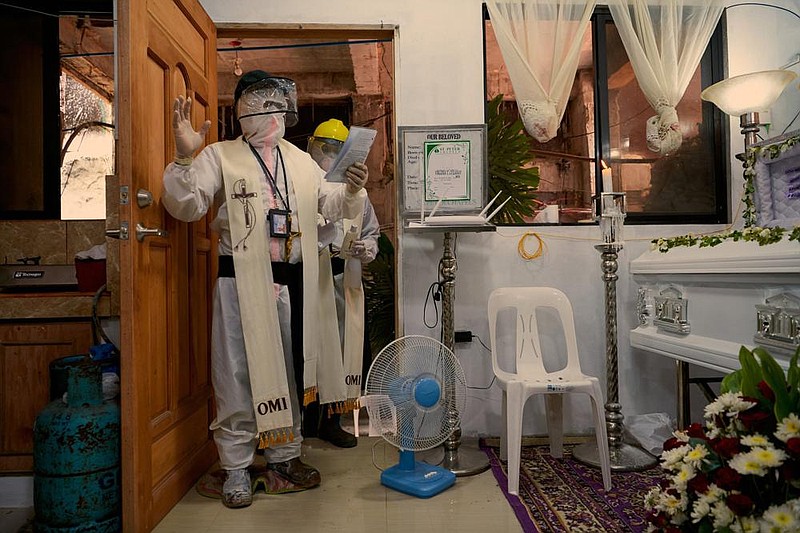MANILA, Philippines -- When the Rev. Eduardo Vasquez dresses for work these days, his vestments are as protective as they are holy. His cassock has been replaced by a safety suit, his collar hidden behind an N-95 respirator mask. All that identifies him as a priest is his stole, a scarf about 6 feet long, the perfect length to measure an acceptable social distance.
After Manila, the Philippine capital, was placed under lockdown in March, Vasquez moved his daily Mass online. That kept him safe from the coronavirus but left some of his poorest parishioners -- the ones without cellphones -- beyond his reach.
So he set off to find them. In the metro area's teeming slums, already reeling from President Rodrigo Duterte's bloody anti-drug campaign, he celebrated Mass, served the Eucharist, and distributed food and face masks.
"Journalists, doctors, garbage collectors and undertakers were out doing their duties" during the lockdown, he said in Caloocan city, where he works. "It's a big knock on the Catholic Church if we don't."
The Philippines has nearly 1,200 deaths from covid-19 and more than 30,000 confirmed coronavirus cases, one of Southeast Asia's highest tallies.
[CORONAVIRUS: Click here for our complete coverage » arkansasonline.com/coronavirus]
As the caseload rose this spring in Manila, a metro area of nearly 14 million people, Vasquez and fellow church volunteers began providing meals, face masks and other assistance to about 300 homeless people a night in Caloocan, a city in the area's north. They refer anyone who exhibits covid-19 symptoms to hospitals.
On many days, Vasquez, 47, tends to his churchyard garden, baptizes children, and attends to the dead at funeral parlors and crematories. On one occasion, he traveled to a village outside Manila, where residents had asked him to bless it as a protection from the virus.
After each trip, he disinfects his personal protective equipment so it can be reused.
"Wearing PPE conveys that there is danger, that you should be careful," he said. "At the same time, it also sends the message that 'Even if it's dangerous, I am here for you, but I will never compromise your safety.'"
The bishop of Caloocan, Pablo Virgilio David, told Vasquez in a letter this month that he had been "God sent" to the diocese for the pandemic.
"Thank you for your out-of-the-box pastoral responses that make the poor know that they are cared for and loved by the church," Virgilio wrote.
Vasquez grew up in Bicol, a region southeast of Manila on the island of Luzon, and began working in Caloocan last year. In the slums, he is known as Father Pon, a play on his nickname. He said that Pon-pon, his nickname in the Bicol dialect, describes one who gathers things and often applies to those who care for the undesirable or defend the vulnerable.
As a boy, Vasquez said, he initially dreamed of becoming a businessman, but changed his mind when he saw a poster with a question that is often attributed to St. Francis of Assisi: "Lord, what do you want me to do?"
He attended seminary on the southern island of Mindanao, where Muslim insurgents have long battled the government of this Catholic-majority country. He was ordained as a priest in Mindanao in 2003.
Five years later, he moved to Maguindanao, a parish on Mindanao Island where a local church had been burned by looters. His first task was convincing the townspeople not to shoot a Muslim man they accused of committing arson.
As the Muslim insurgency displaced people across Mindanao, Vasquez converted his church's grounds into an evacuation center. He also assisted journalists who were investigating one of the country's worst political massacres and served as a spiritual adviser for people in witness-protection programs, including former warlords and jihadis.
Sammy Abdulgani, 33, a former jihadi in Mindanao who met Vasquez while he was serving a prison term, said the priest had been a supportive presence at a particularly difficult time in his life.
"He's always a good example of what a religious man should be," Abdulgani said. "He knew who I am, or was, and the things I did when I was a rebel. But he placed his utmost trust in me."
Vasquez said that his experience in Mindanao turned out to be good preparation for the pandemic. Among other lessons, he said, it taught him that local officials could not be trusted to help the poor in a time of crisis.
"In Mindanao, we knew that corruption was real," he said. "Those goods would never reach the needy."
In Manila, where unemployment is surging and a citywide lockdown has been eased but not yet scrapped, some people have criticized Vasquez on social media for his recent outreach to the poor. They say it implies he has lost faith in the power of his own church.
He disagrees.
"God gave you the capacity to think; it is not enough to rely on faith alone," he said. "It has to be coupled with actions."
